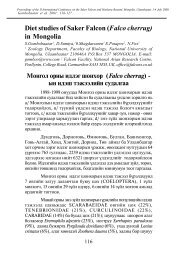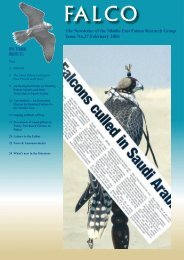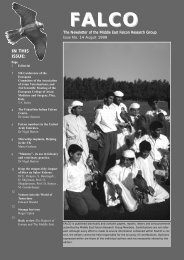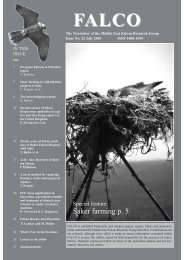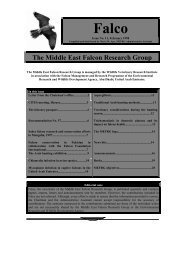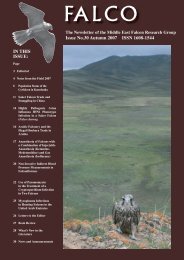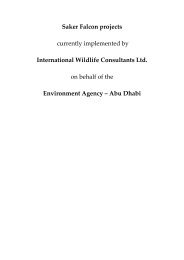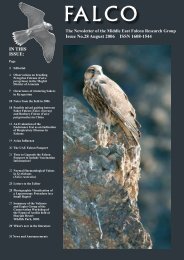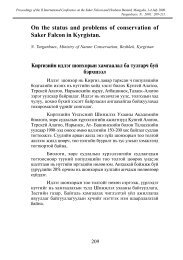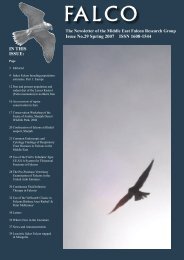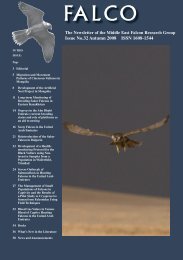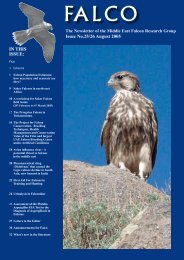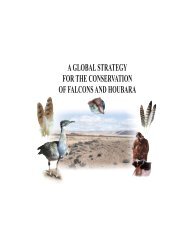falco - International Wildlife Consultants Ltd.
falco - International Wildlife Consultants Ltd.
falco - International Wildlife Consultants Ltd.
You also want an ePaper? Increase the reach of your titles
YUMPU automatically turns print PDFs into web optimized ePapers that Google loves.
Another method of investigation we are pursuing, thatcould be very helpful with our studies, is the comparisonof blood samples from the affected wild vultures inIndia with those of vultures not affected by the declines.Samples from wild-caught Indian vultures now in captivitywould be particularly useful in this respect. We areparticularly interested in receiving serum samples fromclinically healthy old-world vultures (captive or wild).These samples will be stored frozen at the Institute ofZoology, London and kept for use by diagnostic andresearch laboratories investigating the vulture disease inIndia, should such samples prove useful. Comparisonsbetween serum samples collected within and outside Indiamay help us to identify the causative agent. For example,if putative infectious agents are found during the courseof our investigations, the samples would be tested for evidenceof antibodies to that agent and the results comparedwith serum samples collected from the affected vulturesin India. Further details of how to participate with theserum collection can be found on the relevant page of thevulture project web site (www.vulturedeclines.org).The dramatic vulture declinesobserved across India present awhole range of threats, both ecologicallyand to human health.The absence of such importantscavengers will almost certainlyinfluence the numbers and distributionof other scavenging species.For example, as vultureshave declined feral dog populationshave been reported to haveincreased massively, with over1,000 observed recently at acarcase dump in Rajasthan - thiscould pose many associated diseaserisks to humans and wildlife,such as rabies.Himalayan GriffonThe international implicationsof this problem are also veryconcerning. If it is an infectiousdisease that is affecting the tworesident Gyps spp. of vulture inIndia, it is conceivable that it willspread beyond the Indian borders.The ranges of species of the Gyps genus overlap fromIndia through central Asia and the Middle East to SouthAfrica and Western Europe. Griffon vultures are knownto travel widely and it is possible that a disease of Gypsspp. vultures could spread from South Asia throughoutthe old world. Already, there are reports of dead vulturesand population declines in Pakistan and Nepal. Whilethese reports are also of Indian white-backed and longbilledvultures, other Gyps species may also be at risk.Particularly worrying in this respect are recent reportsfrom Dr Prakash of finding small numbers of sick anddead Eurasian griffons Gyps fulvus and Himalayan griffonsGyps himalayenisis on their wintering grounds inIndia.The Birdlife network has been used to alert bird conservationorganisations in all of the Gyps spp. range states ofthe problem. We are encouraging organisations throughoutrange states to closely monitor vultures in their areas.In order to allow comparable results from different countries,standard methods for monitoring and surveillancehave been developed and published on the vulture projectweb site (www.vulturedeclines.org). Further informationabout the project may also be found on this web site.If you would like to support this work financially or inany other way, or if you would like advice or help to startwork on monitoring vultures in your area, please contactus.For pathological investigations and collectionof serum samples: Dr Andrew Cunningham -andrew.cunningham@ioz.ac.ukFor monitoring within India : Dr Vibhu Prakash - jatayu_prakash@yahoo.co.inFor monitoring outside India: Dr Debbie Pain -debbie.pain@rspb.org.uk96, 365-378.References:Oaks, L. (2001) Summaryof Diagnostic Investigationinto Vulture Mortality: PunjabProvince, Pakistan, 200-2001.Reports from the workshop onIndian Gyps vultures. In: Katzner,T., Parry-Jones, J., (Eds.), 4thEurasian Congress on Raptors,Seville, Spain. Estación BiológicaDonaña, Raptor ResearchFoundation, pp. 12-13. Documentcan be downloaded fromwww.vulturedeclines.org. See also: http://www.peregrinefund.org/conserv_vulture_results.html.Prakash, V. (1999) Status of vulturesin Keoladeo National Park,Bharatpur, Rajasthan, with specialreference to population crashin Gyps species. Journal of theBombay Natural History Society,Rahmani, A. R. & Prakash, V. (Eds.) (2000) Brief reporton the <strong>International</strong> Seminar on the Vulture Situation inIndia. 18-20 September 2000. Bombay Natural HistorySociety, Hornbill House, Mumbai, India.Prakash, V. et al. (in press) Catastrophic collapseof Indian white-backed Gyps bengalensis and longbilledGyps indicus vulture populations. BiologicalConservation.11



